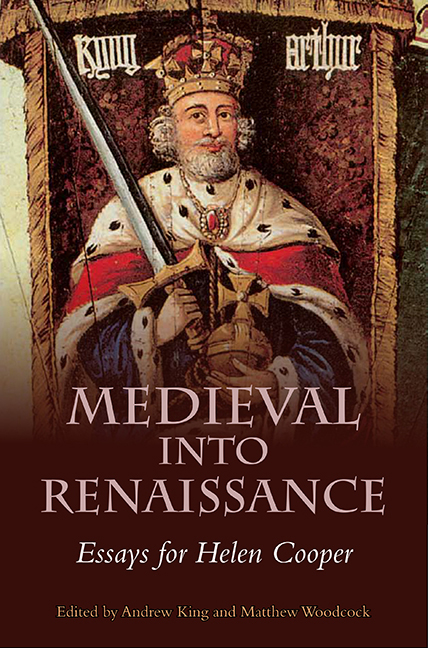Book contents
- Frontmatter
- Contents
- List of Illustrations
- List of Contributors
- Acknowledgments
- Abbreviations
- Introduction
- Unknowe, unkow, Vncovthe, uncouth: From Chaucer and Gower to Spenser and Milton
- Armour that doesn't work: An Anti-meme in Medieval and Renaissance Romance
- ‘Of his ffader spak he no thing’: Family Resemblance and Anxiety of Influence in Fifteenth-Century Prose Romance
- Writing Westwards: Medieval English Romances and their Early Modern Irish Audiences
- Penitential Romance after the Reformation
- The English Laureate in Time: John Skelton's Garland of Laurel
- Thomas Churchyard and the Medieval Complaint Tradition
- Placing Arcadia
- Fathers, Sons and Surrogates: Fatherly Advice in Hamlet
- ‘To visit the sick court’: Misogyny as Disease in Swetnam the Woman-Hater
- The Monument of Uncertainty: Sovereign and Literary Authority in Samuel Sheppard's The Faerie King
- Mopsa's Arcadia: Choice Flowers Gathered out of Sir Philip Sidney's Rare Garden into Eighteenth-Century Chapbooks
- Bibliography
- Index
- A Bibliography of Helen Cooper's Published Works
- Tabula Gratulatoria
‘Of his ffader spak he no thing’: Family Resemblance and Anxiety of Influence in Fifteenth-Century Prose Romance
Published online by Cambridge University Press: 05 July 2016
- Frontmatter
- Contents
- List of Illustrations
- List of Contributors
- Acknowledgments
- Abbreviations
- Introduction
- Unknowe, unkow, Vncovthe, uncouth: From Chaucer and Gower to Spenser and Milton
- Armour that doesn't work: An Anti-meme in Medieval and Renaissance Romance
- ‘Of his ffader spak he no thing’: Family Resemblance and Anxiety of Influence in Fifteenth-Century Prose Romance
- Writing Westwards: Medieval English Romances and their Early Modern Irish Audiences
- Penitential Romance after the Reformation
- The English Laureate in Time: John Skelton's Garland of Laurel
- Thomas Churchyard and the Medieval Complaint Tradition
- Placing Arcadia
- Fathers, Sons and Surrogates: Fatherly Advice in Hamlet
- ‘To visit the sick court’: Misogyny as Disease in Swetnam the Woman-Hater
- The Monument of Uncertainty: Sovereign and Literary Authority in Samuel Sheppard's The Faerie King
- Mopsa's Arcadia: Choice Flowers Gathered out of Sir Philip Sidney's Rare Garden into Eighteenth-Century Chapbooks
- Bibliography
- Index
- A Bibliography of Helen Cooper's Published Works
- Tabula Gratulatoria
Summary
In recent decades, the traditionally disparaged medieval popular romances have received increased attention. Studies of this previously marginalised genre have, however, tended to remain silent about texts at its own margins, such as the Middle English prose romances. The prose romances are even less frequently allowed into conversation with courtly romances, and if they figure anywhere, it is usually in discussions of Arthurian romance. Yet on the other hand, Malory's Arthuriad still tends to be considered as a genre unto itself, rather than as one among quite a few English prose romances written around the same time. According to Larry Benson, the other fifteenth-century English prose romances ‘hardly established a tradition of English secular prose on which Malory could draw for his style’, and if silence implies consent, more recent criticism has tended to agree. This essay aims to explore the extent to which the English prose romances can be read together, as a sub-genre, and as a response to more conventional romances, a response in which the shift in form or medium may be as telling as the shift in content.
One auspicious exception to the relative neglect of the prose romances is Helen Cooper's 1997 essay ‘Counter-Romance: Civil Strife and Father-Killing in the Prose Romances’, which adumbrates a way in which Malory's Morte Darthur can be understood as part of a larger insular genre. Cooper argues convincingly that these texts take a distinctly darker approach to individual success and chivalric cohesion than is found in earlier verse romances. Yet whereas Cooper focuses on the texts’ concerns about family members betraying each other, this essay considers a wider range of familial anxieties: a range that sometimes includes, but goes beyond, betrayal within the family unit or affinity group. For instance, in the late prose romance Huon of Burdeux (c.1515), when Earl Amaury, the ‘felon traytour’, is glossed as ‘son to on of the nevewse of the traytour Ganelon’, the reader is invited to infer that Amaury is predisposed to be a traitor by blood. The idea of genetic ‘treasonousness’ is a recurring axiom in Huon; here, this is not a fear that a family will become fractured, but rather a fear that a family will show too much unity, but of the wrong sort.
- Type
- Chapter
- Information
- Medieval into RenaissanceEssays for Helen Cooper, pp. 55 - 72Publisher: Boydell & BrewerPrint publication year: 2016

